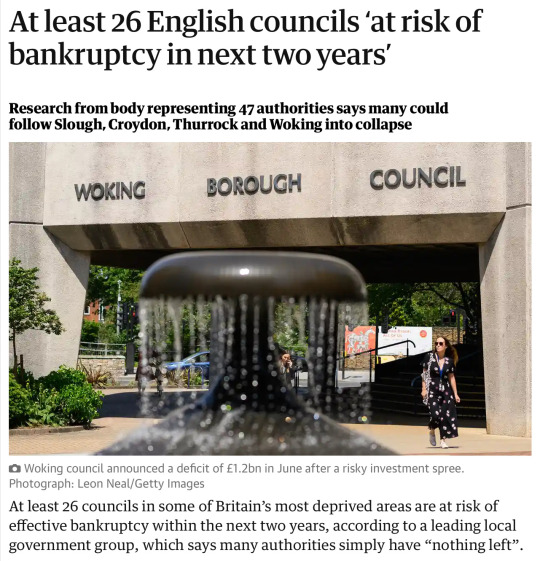#austerity
Link
Shoplifters who spoke to Novara Media said the cost of living crisis had pushed them to steal more of life’s essentials. “A couple of times I’ve been on the verge of crying when I go to buy Sainsbury’s Basics apple and blackcurrant squash and realise the price has doubled in the past three months,” said John.
Lara, a culture worker from London, has started shoplifting groceries more frequently; she said it has become more socially acceptable in her circles. “I know that other people do it, and I’ve seen how other people do it, and that really helped,” she said. Previously, she avoided stealing because her upbringing and wider moralism had convinced her it was “a shameful thing” to do.
“Before, I would have described stealing as this really anti-Islamic thing to do,” she said. Shoplifting is also especially frowned-upon by “parents who come from a working-class or lower middle-class background,” she said, because of how classist ‘scrounger’ stereotypes “trickle down to how we surveil and shame each other.”
Nowadays however, Lara sees shoplifting as “one of the few guerrilla tactics we have available to us.”
Alan, a construction worker from London, who, like John and Anna, has been shoplifting around half his groceries in recent months, has “no moral qualms” about stealing from supermarkets. “I just think that the stuff in the world is ours, all of ours,” he said, “and that we’ve invented a really stupid system for the distribution of resources which doesn’t treat them as ours, and treats them as things that can be used for capitalists to make profit.”
He wouldn’t steal things if it meant that “someone’s labour went unrewarded”, he said, but all shoplifting affects is “the profits of shareholders” he said. “[I have] no concerns about that at all.”
[...]
While, for many, shoplifting feels like a form of resistance to untenable living conditions, no one who spoke to Novara Media was sure how to build solidarity between shoplifters. Alan shoplifts food for rough sleepers, but wishes there were more organised approaches to shoplifting – like the mass stealing and redistribution of food that occurred in Greece following the 2008 financial crisis.
Lara believes shoplifting could be “revolutionary” if it could be “more of an organised operation” that involved “getting workers on side”.
“I think it would be really radical if there would be a widespread recognition and acceptance of stealing as a necessary mechanism for resistance,” she says. “If you can’t afford the things that you have to buy, then the logic should be that you just take them.”
14K notes
·
View notes
Text
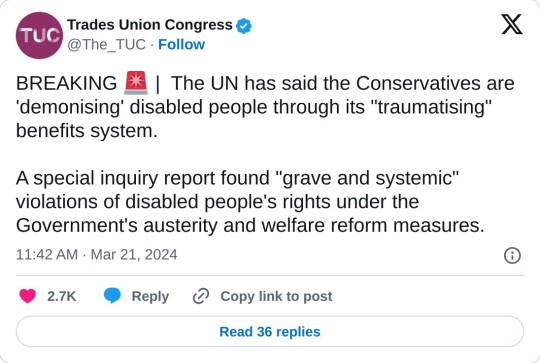
155 notes
·
View notes
Text
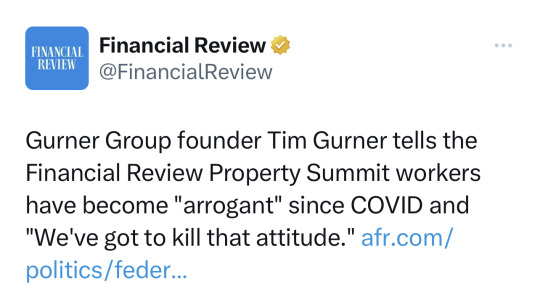
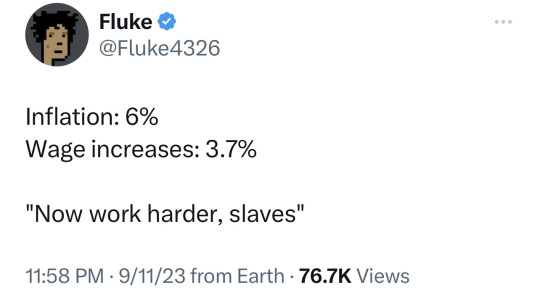
Jesus, what an absolutely cruel and callous person. What he is doing here is a textbook example of projection. “Paid a lot to do not too much,” sounds like the job description for landlords and CEOs.
315 notes
·
View notes
Text
The general strike against austerity measures and the Omnibus Law was strongly felt throughout Argentina. Although the mobilization had its epicenter in the capital, there were massive protests in the main cities of the interior as well. According to Tiempo Argentino, over a million and a half people filled the streets of the country.
105 notes
·
View notes
Text
Prime Minister Justin Trudeau's government unveiled details of its plan to cut $500 million from government spending Thursday — and not all departments are going to be feeling the same impacts.
While some agencies like the Canadian Space Agency and the Invest in Canada Hub will see more than one per cent of their spending frozen and returned to government coffers, 61 departments and agencies don't appear on the list of government bodies taking cuts.
The government said the cost-cutting initiative excluded agents of Parliament and small organizations with budgets under $25 million a year. But many of those not included on the list of organizations affected — such as the Canadian Air Transport Security Authority, the Canadian Security Intelligence Service and the National Capital Commission — have budgets much higher than $25 million.
Continue Reading.
Tagging: @politicsofcanada
#austerity#justin trudeau#cdnpoli#canada#canadian politics#canadian news#LPC#liberal party of canada
112 notes
·
View notes
Text
so who had the government violating human rights law because they hate poor people on their 2023 tory bingo?
yeah so this piece by robert booth just got published in the guardian and it begins as such:
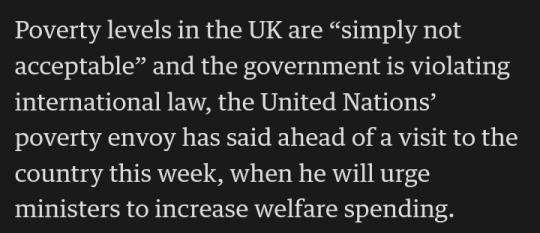
which is not at all surprising because yeah the government really hates poor people here. like as in one of the "solutions" to rising in homelessness in cities is to just,, buy unhoused people a one way train ticket to somewhere else.
its good to know that weve officially reached the level of violating international law. and by good, i dont know what i mean either.
anyway, booth goes on to say:
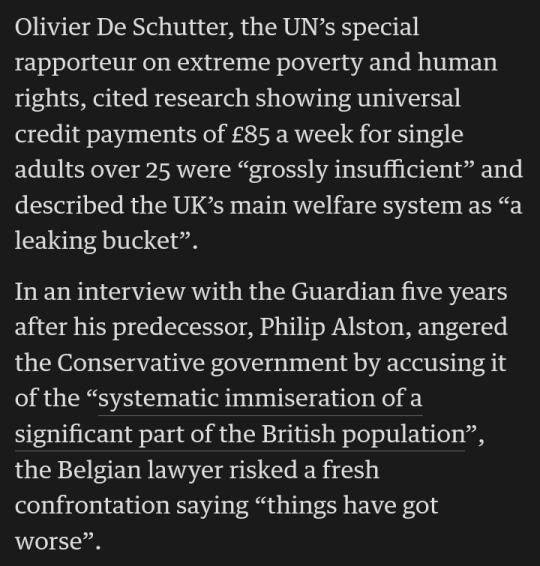

he is, of course, incredibly correct, and im highkey obsessed with him calling the welfare state "a leaking bucket".
obviously, the government gave a response of:
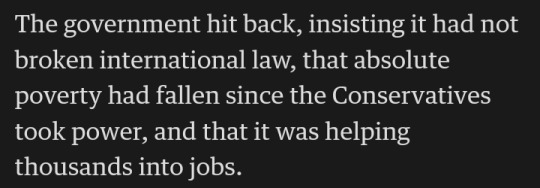
but did also go on to say this:

which doesnt really strengthen their argument. if anything, it actively hampers it.
it is also incredibly funny that the government's response to being accused of human rights violations due to the poverty in their country by the guy whose job involves being the go-to expert on human rights and poverty is akin to a child saying they didnt steal the chocolate that is staining their clothes and their hands and also they are still eating it.
please join me in pointing and laughing. at least, we have that.
de schutter actually offers solutions of his own within the article:

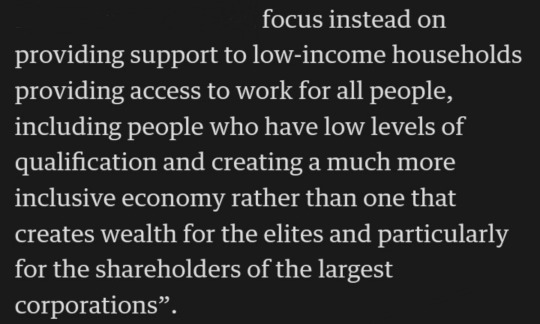
these, of course, famously being loved by tories. loved so much that they just forgot to do any of it during the last 13 years.
yeah, its been 13 fucking years.
if you dont use your vote to vote them out at the next general election, i will break your kneecaps with a rounders bat.
anyway, robert booth finishes the article off with:
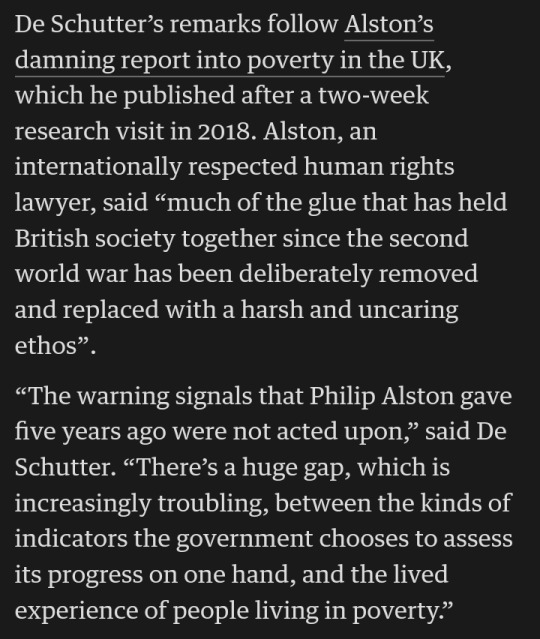
and wheres the fucking lie? it hits the nail on the head so accurately, its honestly as impressing as it is depressing.
obviously, this isnt the entire article and i would implore you to read all of it.
i dont exactly have my hopes up for the government actually doing anything to effectively address poverty, but hey, you never know.
#uk#uk politics#ukpol#britpol#british politics#tories#poverty rates#the un#fuck tories#robert booth#the guardian#olivier de schutter#philip alston#universal credit#conservatives#austerity#hell country#long post
94 notes
·
View notes
Text
Under David Cameron's government, 1000s died after being declared fit to work.
Never let him forget it.
83 notes
·
View notes
Quote
Degrowth is the opposite of recession: recessions are unintentional, while degrowth is planned and intentional; recessions make inequality worse, degrowth seeks to reduce it; recessions typically lead to cuts in public services while degrowth is about de-commodifying essential goods and services; recessions often cause bold policies for sustainability to be abandoned for the sake of restarting growth, while degrowth is explicitly for a rapid and decisive transformation.
The Future Is Degrowth: A Guide to a World Beyond Capitalism
322 notes
·
View notes
Text
Shot:

Chaser:

162 notes
·
View notes
Text
Rarely do I quote Republicans for political insights, but this video of Ronald Reagan telling the truth about how Social Security doesn’t contribute to the deficit was too great to pass up. And Mitch McConnell and Republicans know Social Security doesn’t contribute to the deficit, but that won’t stop them from pushing their big lie anyway.
And lest you think that Ronald Reagan even momentarily did something good, always remember that Reagan was the first one to tax Social Security in order to pay for his tax cuts to the rich.

The only time Republicans pretend to care about the federal deficit is when there’s a Democratic President in the White House.
Peep the decades-long okie doke:
1) Republicans run up the deficit by passing giant tax cuts for millionaires and billionaires
2) and then they say that to reduce the deficit, which remember, they just caused, we need austerity cuts to the social safety net: Social Security, Medicare and Medicaid. In other words, poor people need to go without, experience some belt tightening & austerity to pay for rich people living lavishly. It’s class warfare. It’s inflicting austerity on the poor to pay for the transfer of wealth (theft) to the rich.
Conservatives venomously refer to these social programs “entitlements” as if they’re charity or handouts or something, but you earned every penny of that money—you literally have the money (taxes) taken out of your paychecks over the years. That is YOUR money.
And the deficit? That’s money that’s already been spent. It’s not money Congress is trying to decide how to appropriate in the future—IT’S MONEY THAT HAS ALREADY BEEN SPENT. So when Republicans threaten to not pay the debt, you might be surprised to know that they’re basically saying America shouldn’t pay its bills. Or maybe you wouldn’t be surprised.
The bottom line is this: Republicans run up the deficit, and Dems lower deficits.

But here’s the real kicker - deficits aren’t nearly as important as Republicans make them out to be. It’s a bit more complicated than a few sentences, but if deficits were truly as catastrophic as Republicans say, then they wouldn’t keep running up the debt every time they’re in control of Congress.
Not that I’m completely against running up a deficit. Especially if it’s used on things like Medicare For All, or universal education.
#politics#ronald reagan#social security#mitch mcconnell#republicans#debt ceiling#national debt#deficit hawks#economics#deficit#austerity
89 notes
·
View notes
Link
An estimated 31 million Americans have now been thrown off what’s been called “the hunger cliff.”
Those drastic cuts have food banks bracing for impact, and some grocery executives celebrating. On a late February earnings call of Grocery Outlet, a discount supermarket chain that relies on SNAP for a high percentage of its sales, the company’s chief financial officer cheered the coming reductions. “In many ways,” he told investors, it “is good for our model as those benefits decline.”
“It does put more pressure on those consumers, and they come to us to stretch their dollar,” he said of the impending cuts.
#joe-biden#democrats#food#poverty#racism#capitalism#big business#SNAP benefits#food stamps#hunger#workers#food apartheid#cutbacks#austerity
429 notes
·
View notes
Text
Why the Fed wants to crush workers

The US Federal Reserve has two imperatives: keeping employment high and inflation low. But when these come into conflict — when unemployment falls to near-zero — the Fed forgets all about full employment and cranks up interest rates to “cool the economy” (that is, “to destroy jobs and increase unemployment”).
An economy “cools down” when workers have less money, which means that the prices offered for goods and services go down, as fewer workers have less money to spend. As with every macroeconomic policy, raising interest rates has “distributional effects,” which is economist-speak for “winners and losers.”
Predicting who wins and who loses when interest rates go up requires that we understand the economic relations between different kinds of rich people, as well as relations between rich people and working people. Writing today for The American Prospect’s superb Great Inflation Myths series, Gerald Epstein and Aaron Medlin break it down:
https://prospect.org/economy/2023-01-19-inflation-federal-reserve-protects-one-percent/
Recall that the Fed has two priorities: full employment and low interest rates. But when it weighs these priorities, it does so through “finance colored” glasses: as an institution, the Fed requires help from banks to carry out its policies, while Fed employees rely on those banks for cushy, high-paid jobs when they rotate out of public service.
Inflation is bad for banks, whose fortunes rise and fall based on the value of the interest payments they collect from debtors. When the value of the dollar declines, lenders lose and borrowers win. Think of it this way: say you borrow $10,000 to buy a car, at a moment when $10k is two months’ wages for the average US worker. Then inflation hits: prices go up, workers demand higher pay to keep pace, and a couple years later, $10k is one month’s wages.
If your wages kept pace with inflation, you’re now getting twice as many dollars as you were when you took out the loan. Don’t get too excited: these dollars buy the same quantity of goods as your pre-inflation salary. However, the share of your income that’s eaten by that monthly car-loan payment has been cut in half. You just got a real-terms 50% discount on your car loan!
Inflation is great news for borrowers, bad news for lenders, and any given financial institution is more likely to be a lender than a borrower. The finance sector is the creditor sector, and the Fed is institutionally and personally loyal to the finance sector. When creditors and debtors have opposing interests, the Fed helps creditors win.
The US is a debtor nation. Not the national debt — federal debt and deficits are just scorekeeping. The US government spends money into existence and taxes it out of existence, every single day. If the USG has a deficit, that means it spent more than than it taxed, which is another way of saying that it left more dollars in the economy this year than it took out of it. If the US runs a “balanced budget,” then every dollar that was created this year was matched by another dollar that was annihilated. If the US runs a “surplus,” then there are fewer dollars left for us to use than there were at the start of the year.
The US debt that matters isn’t the federal debt, it’s the private sector’s debt. Your debt and mine. We are a debtor nation. Half of Americans have less than $400 in the bank.
https://www.fool.com/the-ascent/personal-finance/articles/49-of-americans-couldnt-cover-a-400-emergency-expense-today-up-from-32-in-november/
Most Americans have little to no retirement savings. Decades of wage stagnation has left Americans with less buying power, and the economy has been running on consumer debt for a generation. Meanwhile, working Americans have been burdened with forms of inflation the Fed doesn’t give a shit about, like skyrocketing costs for housing and higher education.
When politicians jawbone about “inflation,” they’re talking about the inflation that matters to creditors. Debtors — the bottom 90% — have been burdened with three decades’ worth of steadily mounting inflation that no one talks about. Yesterday, the Prospect ran Nancy Folbre’s outstanding piece on “care inflation” — the skyrocketing costs of day-care, nursing homes, eldercare, etc:
https://prospect.org/economy/2023-01-18-inflation-unfair-costs-of-care/
As Folbre wrote, these costs are doubly burdensome, because they fall on family members (almost entirely women), who have to sacrifice their own earning potential to care for children, or aging people, or disabled family members. The cost of care has increased every year since 1997:
https://pluralistic.net/2023/01/18/wages-for-housework/#low-wage-workers-vs-poor-consumers
So while politicians and economists talk about rescuing “savers” from having their nest-eggs whittled away by inflation, these savers represent a minuscule and dwindling proportion of the public. The real beneficiaries of interest rate hikes isn’t savers, it’s lenders.
Full employment is bad for the wealthy. When everyone has a job, wages go up, because bosses can’t threaten workers with “exile to the reserve army of the unemployed.” If workers are afraid of ending up jobless and homeless, then executives seeking to increase their own firms’ profits can shift money from workers to shareholders without their workers quitting (and if the workers do quit, there are plenty more desperate for their jobs).
What’s more, those same executives own huge portfolios of “financialized” assets — that is, they own claims on the interest payments that borrowers in the economy pay to creditors.
The purpose of raising interest rates is to “cool the economy,” a euphemism for increasing unemployment and reducing wages. Fighting inflation helps creditors and hurts debtors. The same people who benefit from increased unemployment also benefit from low inflation.
Thus: “the current Fed policy of rapidly raising interest rates to fight inflation by throwing people out of work serves as a wealth protection device for the top one percent.”
Now, it’s also true that high interest rates tend to tank the stock market, and rich people also own a lot of stock. This is where it’s important to draw distinctions within the capital class: the merely rich do things for a living (and thus care about companies’ productive capacity), while the super-rich own things for a living, and care about debt service.
Epstein and Medlin are economists at UMass Amherst, and they built a model that looks at the distributional outcomes (that is, the winners and losers) from interest rate hikes, using data from 40 years’ worth of Fed rate hikes:
https://peri.umass.edu/images/Medlin_Epstein_PERI_inflation_conf_WP.pdf
They concluded that “The net impact of the Fed’s restrictive monetary policy on the wealth of the top one percent depends on the timing and balance of [lower inflation and higher interest]. It turns out that in recent decades the outcome has, on balance, worked out quite well for the wealthy.”
How well? “Without intervention by the Fed, a 6 percent acceleration of inflation would erode their wealth by around 30 percent in real terms after three years…when the Fed intervenes with an aggressive tightening, the 1%’s wealth only declines about 16 percent after three years. That is a 14 percent net gain in real terms.”
This is why you see a split between the one-percenters and the ten-percenters in whether the Fed should continue to jack interest rates up. For the 1%, inflation hikes produce massive, long term gains. For the 10%, those gains are smaller and take longer to materialize.
Meanwhile, when there is mass unemployment, both groups benefit from lower wages and are happy to keep interest rates at zero, a rate that (in the absence of a wealth tax) creates massive asset bubbles that drive up the value of houses, stocks and other things that rich people own lots more of than everyone else.
This explains a lot about the current enthusiasm for high interest rates, despite high interest rates’ ability to cause inflation, as Joseph Stiglitz and Ira Regmi wrote in their recent Roosevelt Institute paper:
https://rooseveltinstitute.org/wp-content/uploads/2022/12/RI_CausesofandResponsestoTodaysInflation_Report_202212.pdf
The two esteemed economists compared interest rate hikes to medieval bloodletting, where “doctors” did “more of the same when their therapy failed until the patient either had a miraculous recovery (for which the bloodletters took credit) or died (which was more likely).”
As they document, workers today aren’t recreating the dread “wage-price spiral” of the 1970s: despite low levels of unemployment, workers wages still aren’t keeping up with inflation. Inflation itself is falling, for the fairly obvious reason that covid supply-chain shocks are dwindling and substitutes for Russian gas are coming online.
Economic activity is “largely below trend,” and with healthy levels of sales in “non-traded goods” (imports), meaning that the stuff that American workers are consuming isn’t coming out of America’s pool of resources or manufactured goods, and that spending is leaving the US economy, rather than contributing to an American firm’s buying power.
Despite this, the Fed has a substantial cheering section for continued interest rates, composed of the ultra-rich and their lickspittle Renfields. While the specifics are quite modern, the underlying dynamic is as old as civilization itself.
Historian Michael Hudson specializes in the role that debt and credit played in different societies. As he’s written, ancient civilizations long ago discovered that without periodic debt cancellation, an ever larger share of a societies’ productive capacity gets diverted to the whims of a small elite of lenders, until civilization itself collapses:
https://www.nakedcapitalism.com/2022/07/michael-hudson-from-junk-economics-to-a-false-view-of-history-where-western-civilization-took-a-wrong-turn.html
Here’s how that dynamic goes: to produce things, you need inputs. Farmers need seed, fertilizer, and farm-hands to produce crops. Crucially, you need to acquire these inputs before the crops come in — which means you need to be able to buy inputs before you sell the crops. You have to borrow.
In good years, this works out fine. You borrow money, buy your inputs, produce and sell your goods, and repay the debt. But even the best-prepared producer can get a bad beat: floods, droughts, blights, pandemics…Play the game long enough and eventually you’ll find yourself unable to repay the debt.
In the next round, you go into things owing more money than you can cover, even if you have a bumper crop. You sell your crop, pay as much of the debt as you can, and go into the next season having to borrow more on top of the overhang from the last crisis. This continues over time, until you get another crisis, which you have no reserves to cover because they’ve all been eaten up paying off the last crisis. You go further into debt.
Over the long run, this dynamic produces a society of creditors whose wealth increases every year, who can make coercive claims on the productive labor of everyone else, who not only owes them money, but will owe even more as a result of doing the work that is demanded of them.
Successful ancient civilizations fought this with Jubilee: periodic festivals of debt-forgiveness, which were announced when new monarchs assumed their thrones, or after successful wars, or just whenever the creditor class was getting too powerful and threatened the crown.
Of course, creditors hated this and fought it bitterly, just as our modern one-percenters do. When rulers managed to hold them at bay, their nations prospered. But when creditors captured the state and abolished Jubilee, as happened in ancient Rome, the state collapsed:
https://pluralistic.net/2022/07/08/jubilant/#construire-des-passerelles
Are we speedrunning the collapse of Rome? It’s not for me to say, but I strongly recommend reading Margaret Coker’s in-depth Propublica investigation on how title lenders (loansharks that hit desperate, low-income borrowers with triple-digit interest loans) fired any employee who explained to a borrower that they needed to make more than the minimum payment, or they’d never pay off their debts:
https://www.propublica.org/article/inside-sales-practices-of-biggest-title-lender-in-us
[Image ID: A vintage postcard illustration of the Federal Reserve building in Washington, DC. The building is spattered with blood. In the foreground is a medieval woodcut of a physician bleeding a woman into a bowl while another woman holds a bowl to catch the blood. The physician's head has been replaced with that of Federal Reserve Chairman Jerome Powell.]
#pluralistic#worker power#austerity#monetarism#jerome powell#the fed#federal reserve#finance#banking#economics#macroeconomics#interest rates#the american prospect#the great inflation myths#debt#graeber#michael hudson#indenture#medieval bloodletters
464 notes
·
View notes
Text
The Saskatchewan Teachers’ Federation (STF) has launched a new ad campaign to call out the province for underfunding education once again.
“The Saskatchewan Party continues to ignore their responsibilities for public education,” said a press release from STF. “Instead, they are attempting to mislead and divide the public in order to distract from a growing crisis of their own doing — a crisis caused by years of underfunding public schools.”
The new video campaign points to issues like overcrowded classrooms, a lack of access to the professional resources that students rely on, and year-over-year budget cuts.
Continue Reading.
Tagging: @politicsofcanada
#austerity#Saskatchewan#Saskatchewan Teachers’ Federation#Sask Party#cdnpoli#canada#canadian politics#Education
53 notes
·
View notes
Text

We’ve lost Greece’s manual
This week's newsletter from AthensLive is out:
* The costliest Olympics end up in derelict venues and a financial crisis
* The EU strikes migration deal, while it is revealed pushed-back refugees burned alive
* Major Greek involvement in Predator scandal revealed in detail
The iconic and super-expensive OAKA stadium roof, created by renowned Spanish architect Santiago Calatrava for Greece’s 2004 Olympic Games, has become derelict to such a degree that the stadium closed due to safety reasons, Greeks were told. It was reported that the roof was created with a license for a pergola and that its maintenance manual had been lost…
While the EU was striking an important migration deal that would supposedly lead to a change of its asylum rules to lift pressure on the continent’s border countries, Greek authorities were confiscating the mobile phones of the Coast Guard officers involved in the Pylos shipwreck - a whole 119 days after. Plus, the NYT revealed that refugees who burned alive during Greece’s wildfires were push-back victims.
Finally, a series of investigative reports named Predator Files brings stormy details on Greece’s deep involvement with Predator illegal spyware.
It cannot be recommended strongly enough to read and share this week's updates on the events and developments in Greece here:
https://steadyhq.com/en/athenslivegr/posts/e679cd16-c2ad-4122-86b1-0938f60e2549
For anyone with a wish or need to follow and to gain an insight into recent events in Greece and to read and support independent and investigative journalism in English, the weekly newsletter from AthensLive should be a core element in the reading flow.
If you want the best overview of the events and developments in Greece right now, this is the place to go. Not the mainstream Greek news, but independent journalism with sharp analysis and links to interesting and important topics from a variety of sources.
Become a member and get the newsletter in your inbox every week here:
https://steadyhq.com/en/athenslivegr/newsletter/sign_up
#Greece#OAKA#Olympic Games#Athens 2004#Athens#Olympic Stadium#Memorandum#Austerity#TAIPED#Calatrava#Refugees#Migrants#Migration#Pushback#Evros#Wildfire#Surveillance#Predator#Intellexa
16 notes
·
View notes

